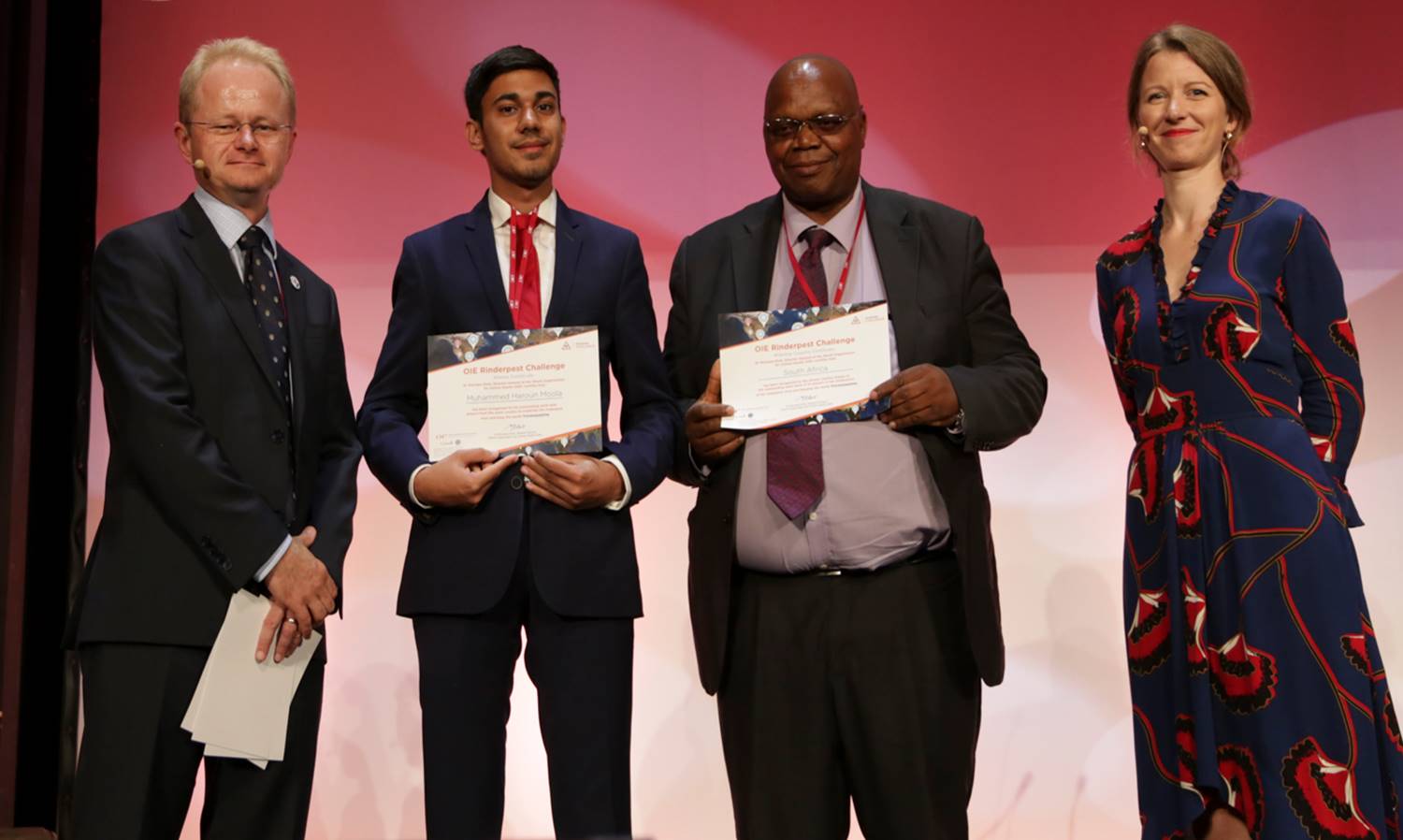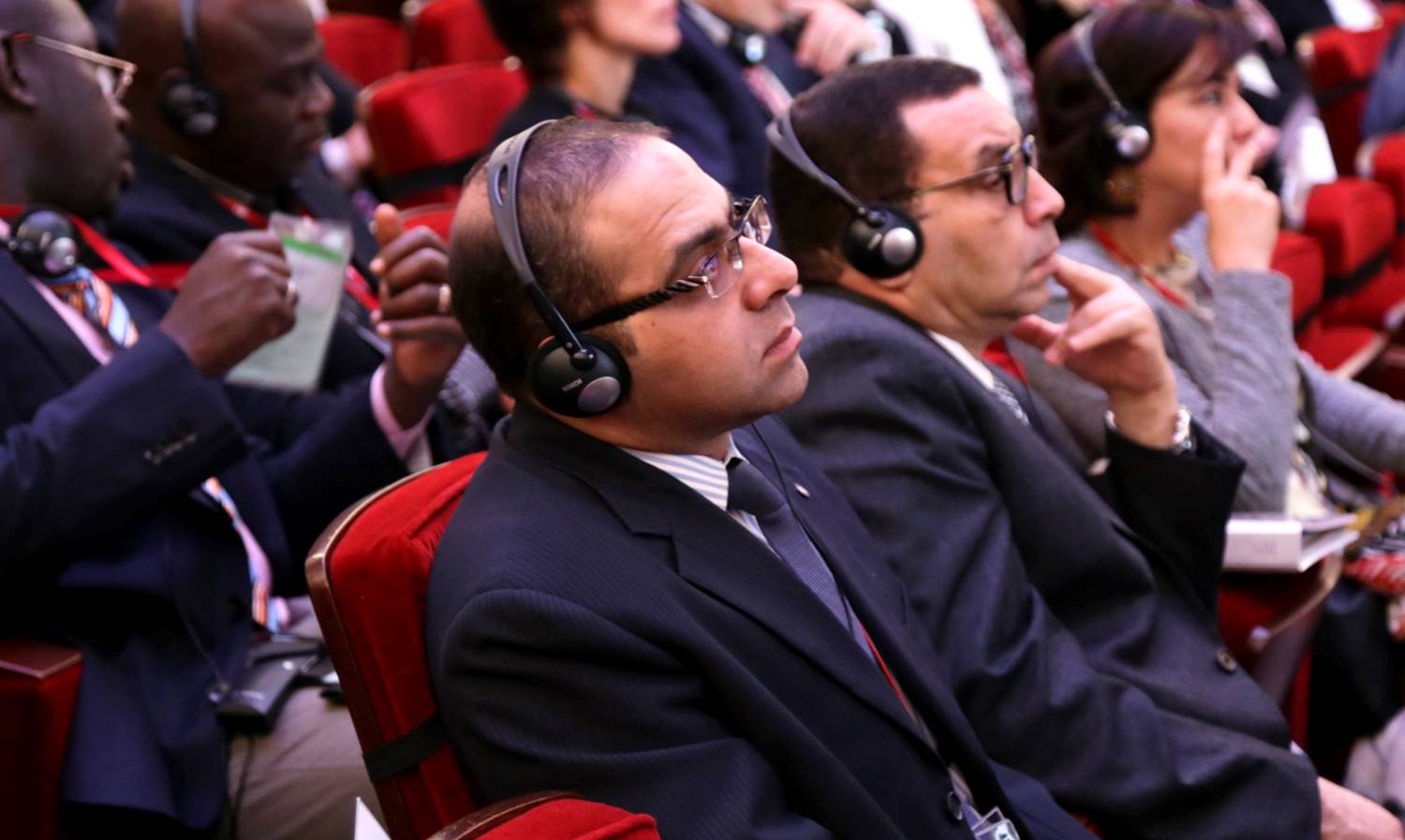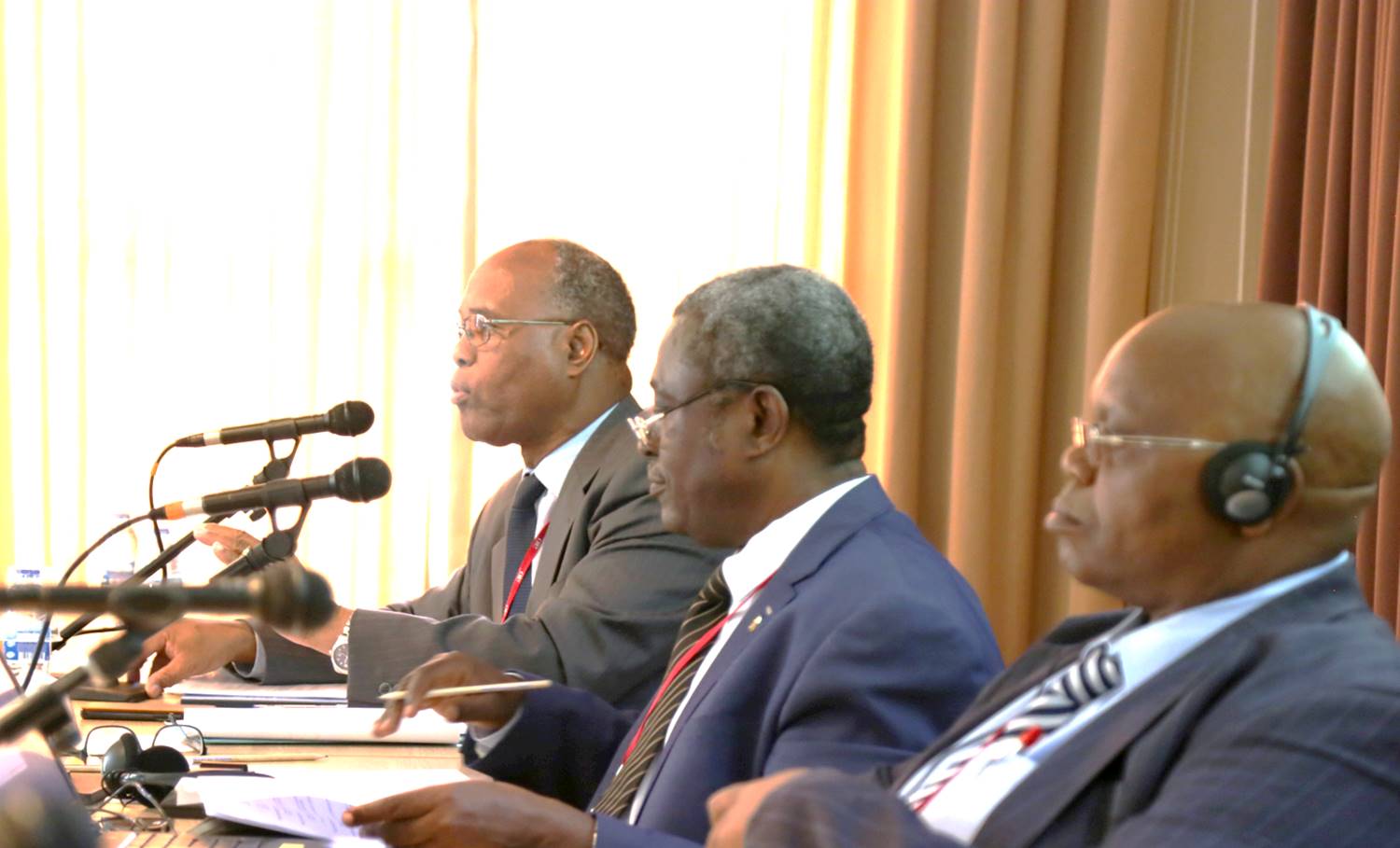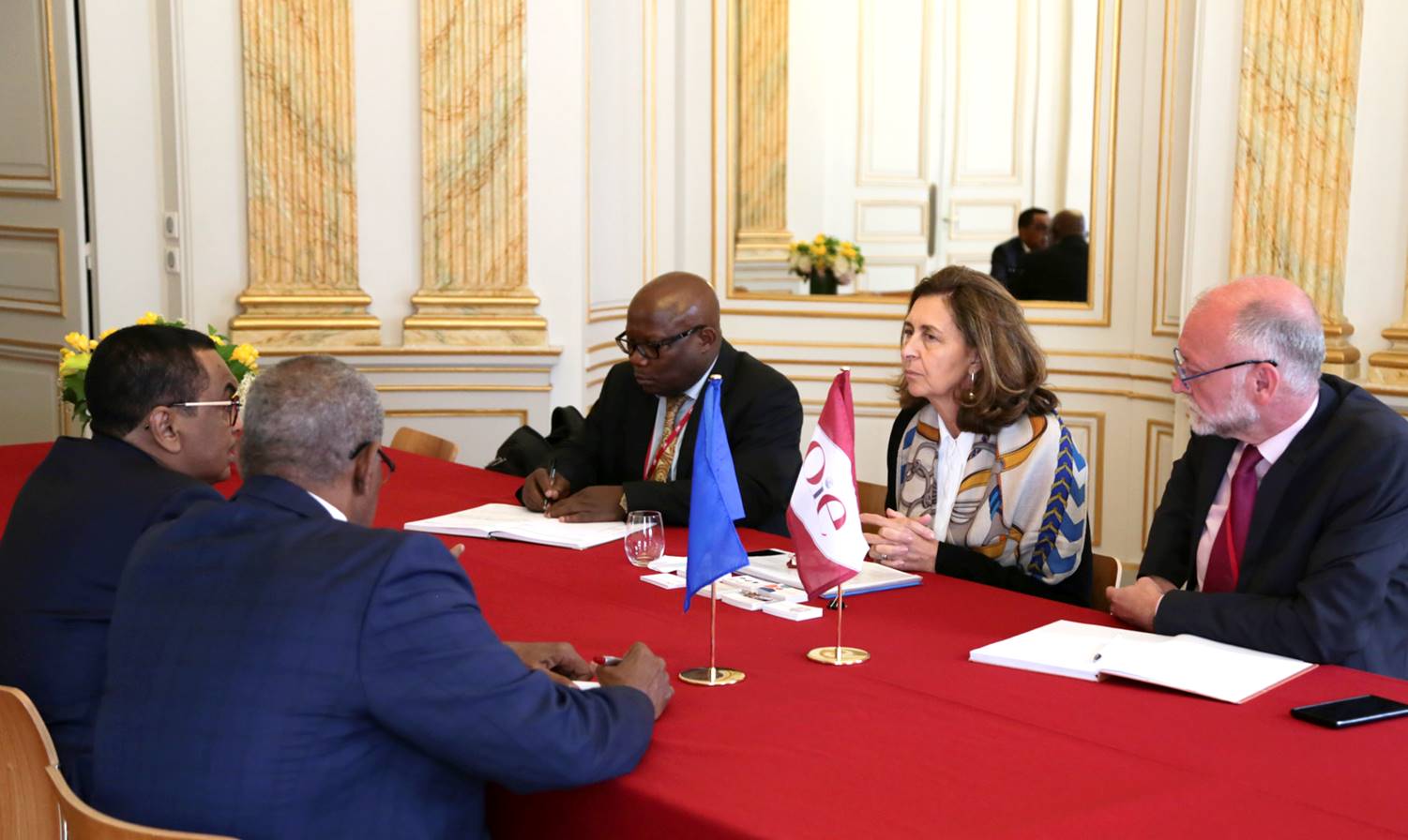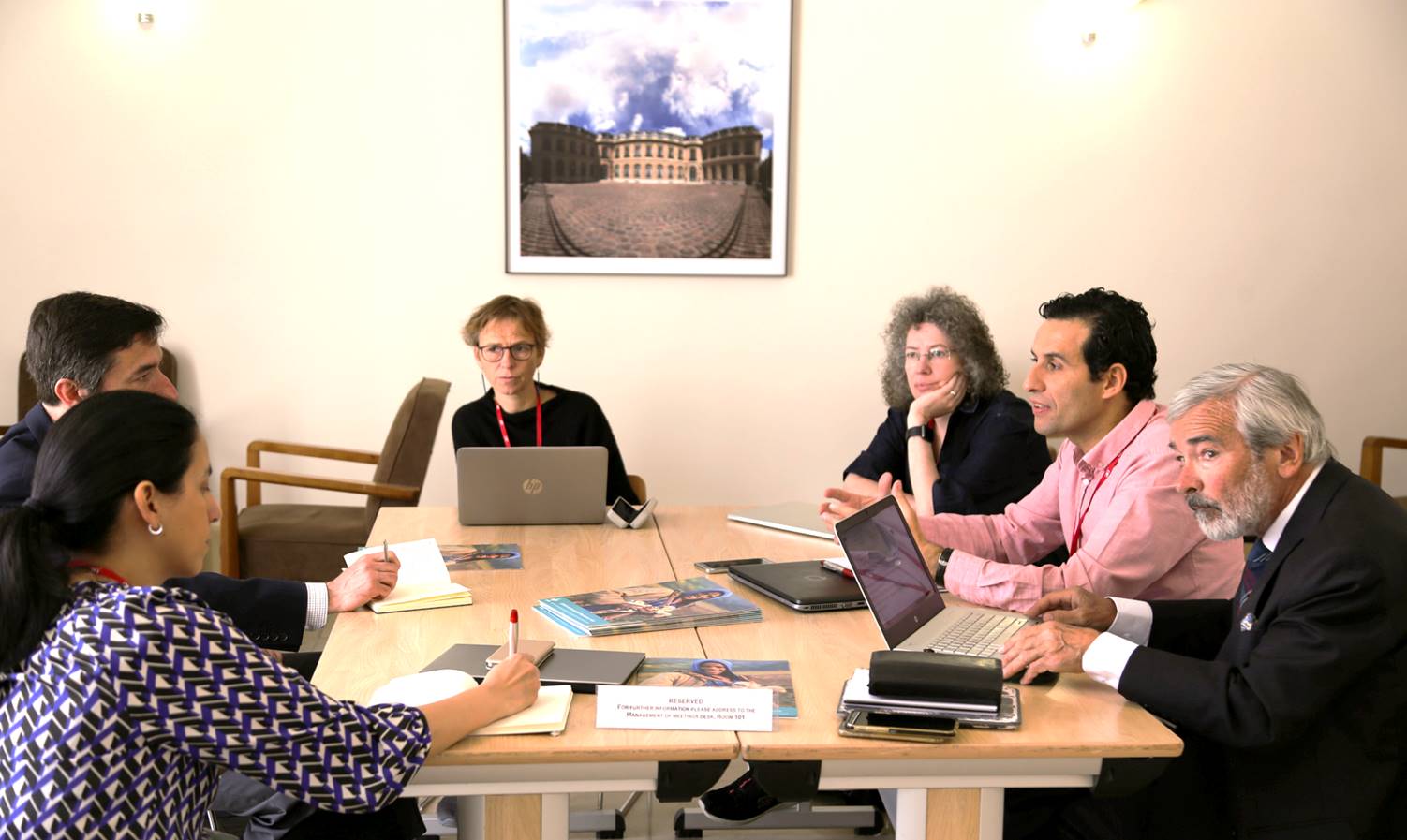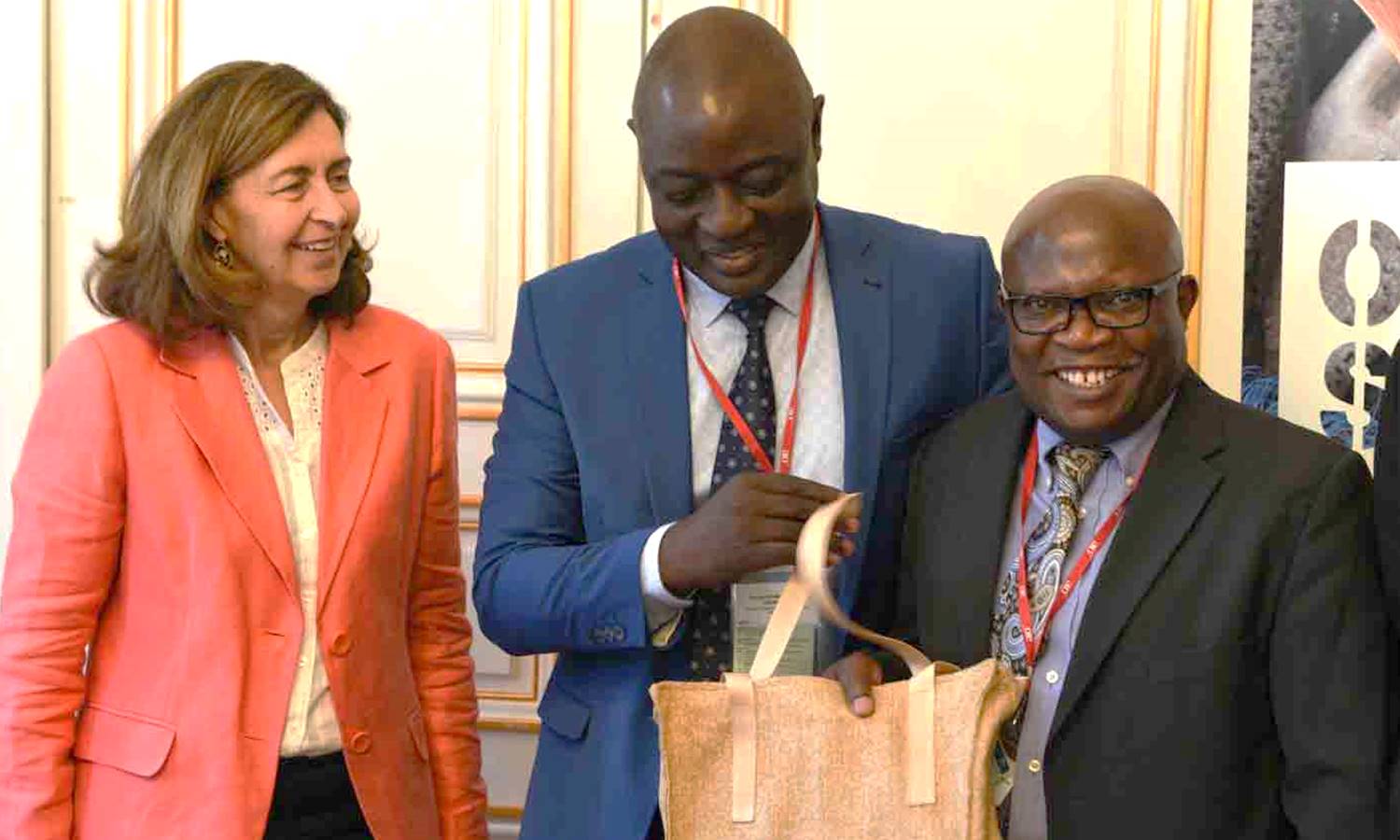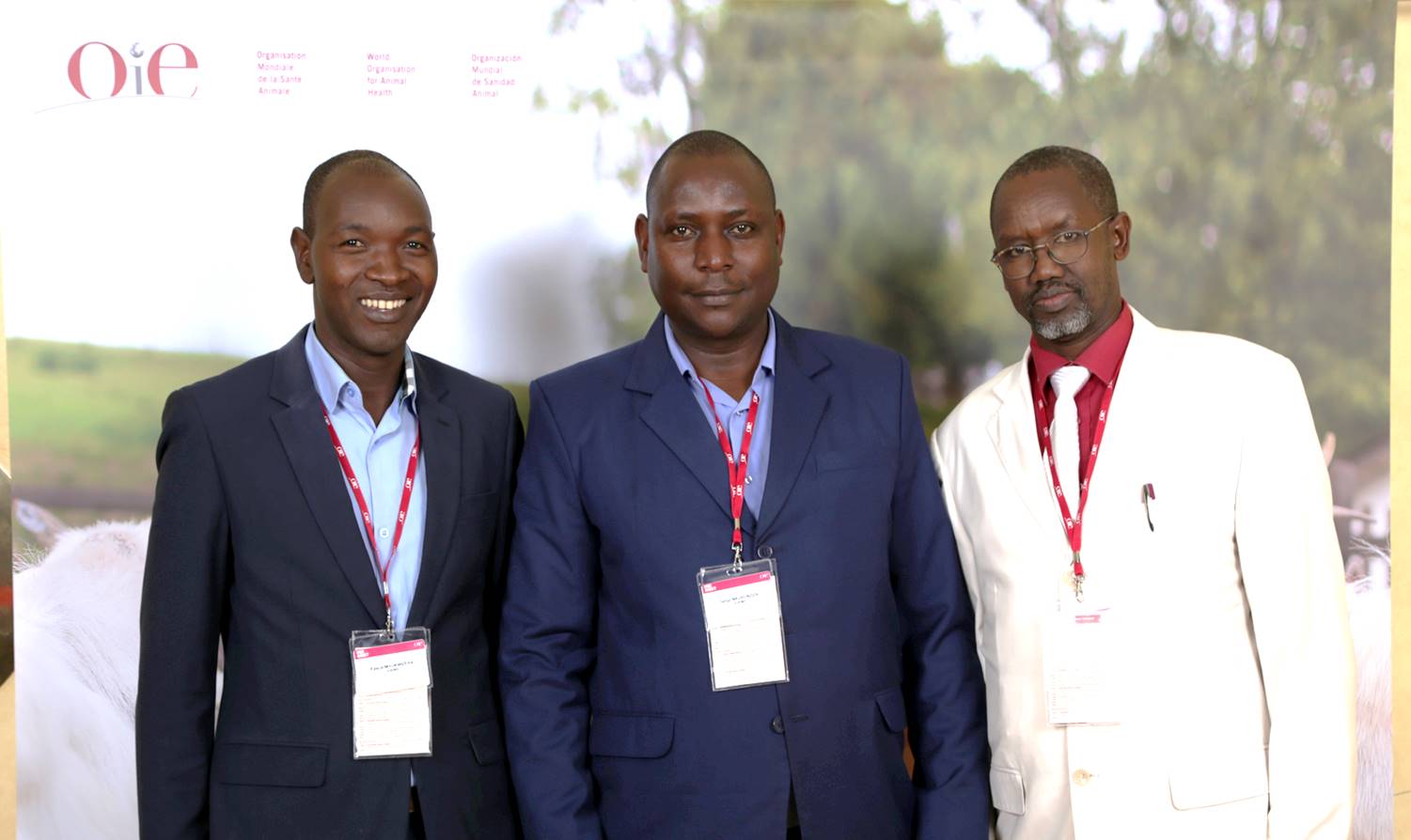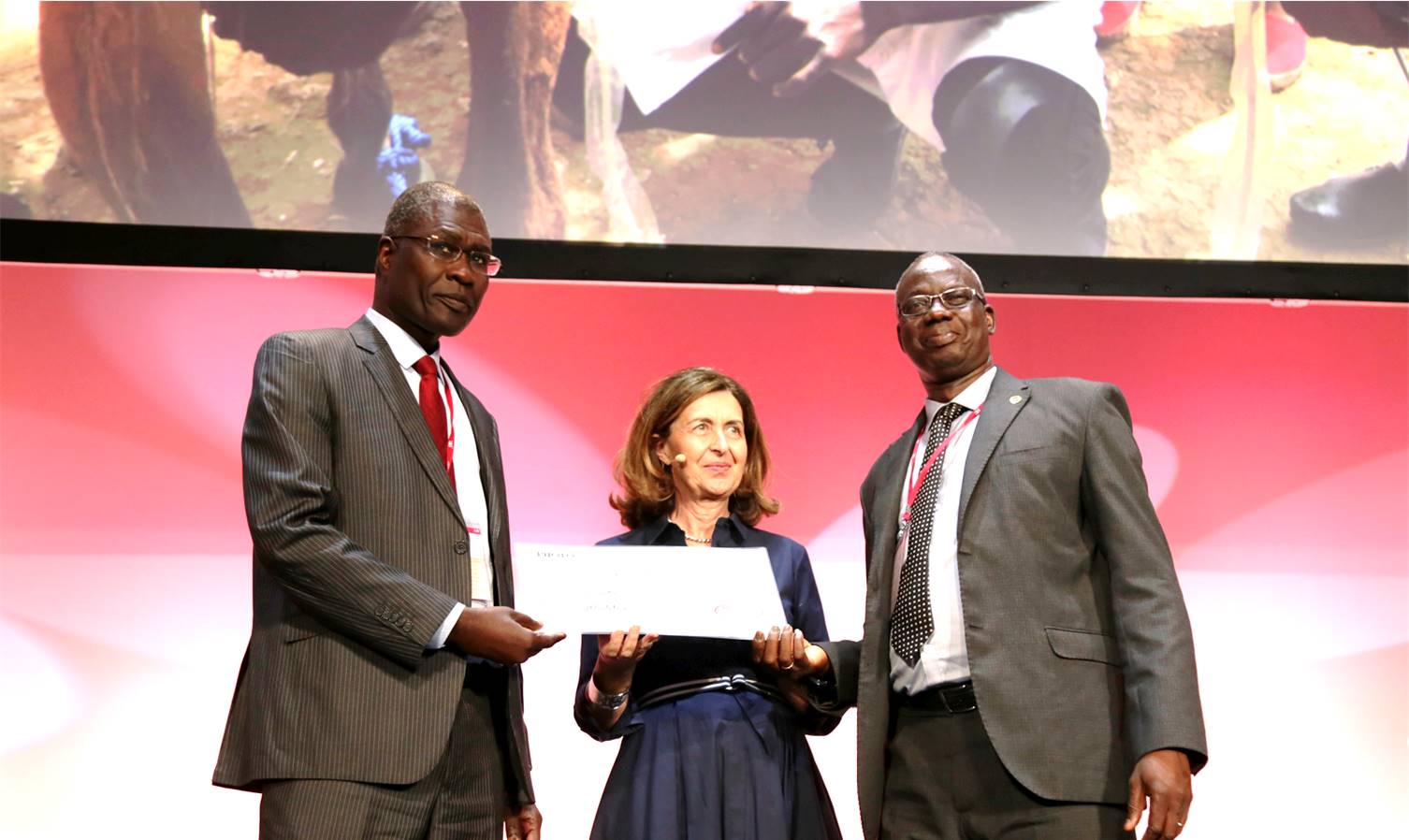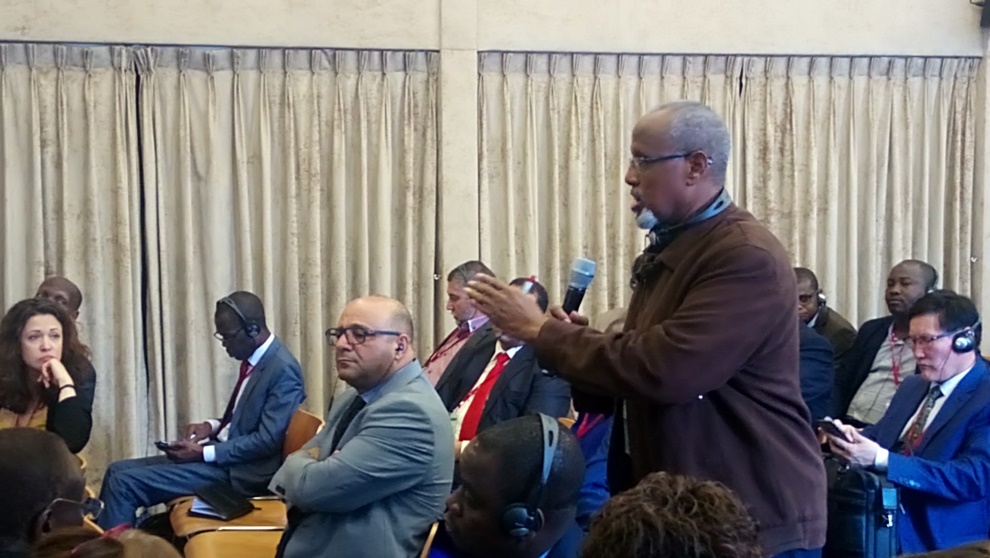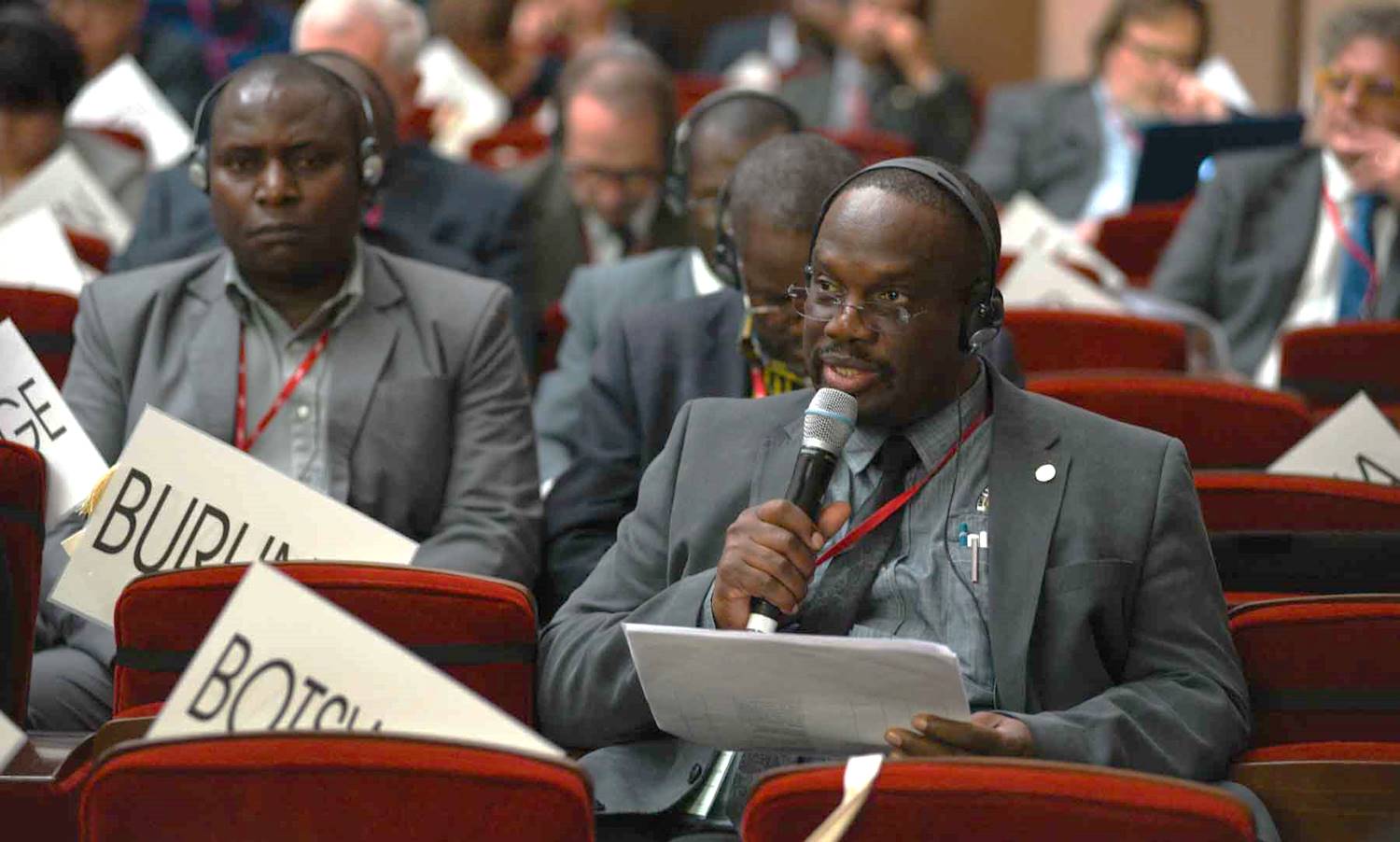
.
87 GS Egypt
Delegation from Egypt. Front : Dr Ahmed Hany Mohamed Fathy Senior Epidemiologist and OIE Focal Point for Notification of Animal Diseases to the OIE. Behind him : Dr. Mahmoud Mohamed Ali Abdelhakim, OIE Delegate
About 800 hundreds participants, representing national Delegations from the 182 OIE Member Countries and several international, intergovernmental, regional and national organisations participated in the event.
The opening ceremony was held in the presence of some 11 Ministers and members of government of OIE Member Countries, as well as the President of the OIE, Dr Mark Schipp (Australia), and the Director General of the OIE, Dr Monique Eloit.
This General Session not only endorsed important new standards and accredited new institutions, but also approved the establishment of a global initiative to control the recent expansion of African Swine Fever (ASF) in several regions of the world in order to reduce its devastating economic impacts on the pig industry. Climate change, international trade and other significant drivers affecting the dynamic of the spread of the diseases were also discussed and addressed. The Session was also the occasion to raise awareness amongst national Delegates on the important role of VPPs for animal disease surveillance, prevention and control as well as the potential of Public-Private Partnerships (PPP) in the veterinary domain.
87 GS
Bureau of the meeting of the OIE Regional Commission for Africa. Fltr : Dr Karim Tounkara, Regional Representative, Dr Honoré N’Lemba, President of the Regional Commission and Dr Botlhe Michael Modisane, Immediate Past President of the OIE Council.
H.E. Mr Fidelis M. Molao, Minister of Agricultural Development and Food Security of Botswana, delivered an address to the World Assembly highlighting the commitment of Botswana on continuing to implement OIE Standards for safe trade and continuing to provide their expertise.
H.E. Mr Perrance Shiri (Minister of Lands, Agriculture, Water, Climate and Rural Resettlement of Zimbabwe) also delivered a speech to the Assembly highlighting the commitment of his country to implement the animal health standards to support safe trade by recognising the major role of veterinary services and so related investments. He also mentioned the importance of Veterinary Services in natural calamities and animal welfare.
Other distinguished guests from Africa also attended the opening ceremony an/or other sessions, i.e. :
The President of the OIE, Dr Mark Schipp presented OIE Honorary Awards to members of the veterinary community for outstanding services to veterinary science and to the OIE. This year – amongst the awarded members – Dr Ahmed Mustafa Hassan (Sudan) received the Medal of Merit for his achievements and outstanding services to the OIE and the veterinary world.
During the Ceremony, Muhammed Haroun Moola from South Africa, received his award as the winner of the Rinderpest game challenge which took place in October 2018 and gathered more than 1,200 participants from 89 different countries
87 GS Somalia
Audience of the Minister of Livestock, Forestry and Range of the Federal Republic of Somalia, H.E. Mr Hussein Mohamud Sheikh Hussein with the OIE Director General, Dr Monique Eloit.
Dr Jimmy Smith – (Director General, ILRI) presented the methodology, findings and conclusions from a study undertaken jointly between OIE and ILRI team working on the topic following administration of a questionnaire. A conceptual framework was developed using the PESTLE approach taking into consideration the political, economic, technological, socio-cultural, economic, legal and environmental factors. The response rate from member countries for the questionnaire was good. It was noted that although member countries had a list of priority diseases, these were usually not considered with respect to climate sensitivity or antimicrobial resistance. Constraints to adaptation to external factors were attributed to lack of standardised approaches and methods, lack of expertise, insufficient human and financial resources, lack of evidence on benefits to adapt to external factors and difficulties in coordinating with other stakeholders. The need for veterinary services to collaborate with stakeholders in response to climate change, food security and preparation in response to external factors was highlighted. The OIE has a role to play in strengthening veterinary services ability to mitigate risks and leverage opportunities for interventions. African veterinary services need to development of systems that will improve the preparedness and response to detection and monitoring risks associated to external factors considering the challenges they already face.
This technical item, explored the global burden of the ASF situation, challenges for effective control and eradication, lessons learned and the key factors that need to be considered for a global coordinated response.
Africa calls for support to OIE´s initiative on African swine fever (ASF). Delegates of African Members of OIE, in a joint position, appreciate the OIE’s initiative to address the global situation of ASF and call for support by other relevant partners on the initiative.
African swine fever, a major transboundary animal disease has for a long time imposed devastating economic losses with tragic consequences in Africa as it affects the poorest communities’ livelihoods in the continent, where pig farming plays a major role with respect to food and nutritional security and improving the income of vulnerable groups.
The African delegates acknowledge the research undertaken in developing a vaccine for ASF as no vaccine is currently available. However, strengthening biosecurity, and supporting the development of the porcine value chain as risk mitigation measures in the context of disease control efforts is also important, as the dominant livestock systems at the Africa continental level will continue to present a major risk for the global pork industry. Support, especially to the small-scale pig farmers, is a priority.
ASF is of global concern and can only be combatted by a joint global effort involving all members of the OIE. The most effective control measure is by effectively applying biosecurity measures on all levels. Resolution No. 33 Global Control of African Swine Fever was adopted after some discussions showing the willingness for global collaboration on controlling the disease.
87 GS ILRI BESST
Interviews of stakeholders being conducted by ILRI staff and experts in the framework of the BESST feasibility study, on the side-lines of the OIE General Session
OIE’s official disease status can be issued for six priority diseases. The OIE World Assembly issued newly 15 certificates to 9 countries, amongst which Botswana had an additional zone (Zone 7) officially recognised free from foot and mouth disease (FMD) where vaccination is not practiced.
87 GS Uganda
Fltr : Dr Monique Eloit, OIE Director General, H.E. Mr Vincent Ssempijja, Minister of Agriculture, Animal Industries and Fisheries of Uganda and Dr Samuel Wakhusama, OIE Representative for Eastern Africa.
The OIE World Assembly of Delegates adopted and revised a number of international standards for terrestrial and aquatic animal diseases and, in summary, amendments to specific articles within the annexes of the glossary, chapters 1.4, 7.Y, 8.14 and 15.1 were adopted to the OIE Terrestrial Animal Health Code.
The President of the Aquatic Code Commission, Dr Ingo Ernst (Australia), highlighted that six chapters were also presented for comments and that then deadline of comments by the Delegates is 7th August 2019.
Of specific interest for Africa is the ongoing work on Tilapia Lake Virus and the adoption of the amendments to the chapter on Aphanomyces invadans epizootic ulcerative syndrome (EUS)
The President of the Terrestrial Code Commission, Dr Etienne Bonbon (France), presented the work programme conducted since the previous General Session as well as a set of amendments for improving international standards.
For the African continent, it is worth noting – among others – the approval of the international standards that enable countries to apply for the endorsement of their national dog-mediated rabies control programmes. An important step forward towards in support of the global strategy aiming at eliminating human deaths from dog-mediated rabies.
87 GS Burundi
Delegation from Burundi. Centre : Ir. Serge Nkurunziza, Director of Livestock Services. Right : Dr Deogratias Nsanganiyumwami, OIE Delegate
Of particular importance for the Africa region, given the increasingly important sector of game farming, and crocodile farming in particular, was the adoption of an entirely new chapter on the Killing of reptiles for their skins, meat and other products (Chapter 7.Y.)
The World Assembly approved the proposed Cooperation Agreement between the OIE and EAC, the East African Community, based in Arusha, Tanzania, as recommended by the OIE Council in February 2019. The EAC is a Regional Economic Community (REC) covering 6 East African OIE Member Countries, i.e. Burundi, Kenya, Rwanda, South Sudan, Tanzania and Uganda. In agreeing to endorse this latest Agreement, OIE has now entered into Cooperation Agreements with all relevant Regional Economic Communities on the African continent.
87 GS
The OIE Delegates of Senegal (left) and Burkina Faso (right) receive the prize money on behalf of the winner of the regional OIE photo competition, Mr. Boris Ouattara of the Inter-State School of Veterinary Sciences and Medicine (EISMV) in Dakar, Senegal.
The OIE Regional Commission for Africa met on 27 May 2019 and was attended by 93 participants, including Delegates and observers from 33 Members of the Commission, one observer country (France), and representatives from seven international or regional organisations (AU-IBAR, CEBEVIRHA, EISMV, GALVmed, IEC, the SADC Secretariat and The Donkey Sanctuary.
The meeting was chaired by Dr Honoré Robert N’lemba Mabela, President of the Bureau of the OIE Regional Commission for Africa and Delegate of the Democratic Republic of the Congo, and Dr Botlhe Michael Modisane, Past-President of the OIE World Assembly of Delegates and Delegate of South Africa, and seconded by Dr Karim Tounkara, OIE Regional Representative for Africa.
Dr Botlhe Michael Modisane (Delegate of South Africa) reiterated his country’s offer to host the 24th Conference of the OIE Regional Commission for Africa in February 2021.
The Regional Commission also selected the technical item (with questionnaire to Members) for inclusion in the agenda of the 24th Conference of the OIE Regional Commission for Africa: “African horse sickness and equine influenza: current situation in Africa and disease control measures”.
Finally, the last session of the Regional Commission, allowed the Delegates of African member countries to participate in the developing the OIE Seventh Strategic Plan by providing their inputs.
An OIE – IHSC (International Horse Sports Confederation) joint side meeting was convened to further discuss international movements of sports horses in Southern Africa, including the progress made with respect to the implementation of the roadmap for the Veterinary Authorities developed at the 2017 workshop. Likewise, within the framework of REMESA, a meeting between three North African countries (Morocco, Tunisia and Algeria) and the European Union was organised to discuss trade issues and sanitary requirements in relation to the movement of horses.
87 GS Somalia Quiliye
87 GS Botswana
Dr Lethlogile Modisa, OIE Delegate of Botswana taking the floor.
The Better Enforcement of Standards for Safer Trade (BESST) Initiative was introduced in a side meeting to the OIE General Session. The OIE has engaged with International Livestock Research Institute (ILRI). The expected outputs are to; accelerate implementation of national, regional and international animal health strategies; disease containment and improved herd health in the Arabic Peninsula and Horn of Africa regions; steady flow of intra-regional trade of live animals and their products and improved food security and nutrition levels at the household level in pastoral communities in the Arabic Peninsula and Horn of Africa regions.
The Global Framework for the progressive control of Transboundary Animal Diseases (GF-TADs) is a joint initiative of FAO and OIE to achieve the prevention, detection and control of transboundary animal diseases(TADs) and in particular to address their original and global dimensions. The initiative combines the strengths of both international organisations to achieve agreed common objectives. It’s African regional chapter, the GF-TADs-for-Africa, after several years of inactivity, was relaunched during a three-way information and hand-over meeting co-chaired by the OIE Director General, the FAO Director of Animal Health and Production (AGA) and the Director of AU-IBAR. The latter will henceforth assume the presidency of the GF-TADs for Africa and is expected to convene the next Regional Steering Committee in Nairobi in July 2019.
